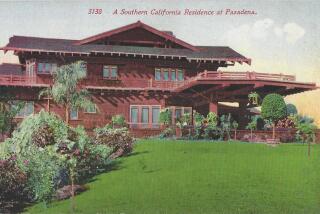British Firm Finds a Safe Home in Southland’s Housing Market
- Share via
Can a globe-trotting engineering and construction company find happiness in the prosaic role of a Southern California home builder?
Britain’s Costain Group PLC hopes so. The construction giant has been looking for steadier work since the sheiks of the oil countries began cutting back on building roads, hospitals, harbors and other big projects in the early 1980s.
In the last eight years Costain has sought more profits under the ground, expanding its coal and gold mining businesses.
Then last year it opened a U.S. home-building subsidiary in Newport Beach.
In fact, Costain has done so well that it has attracted a corporate raider who now owns 7.5% of its stock and may buy more.
Costain is merely the latest of several big British construction firms to take on the Southern California housing market.
They are attracted by a demand for housing so strong that buyers often camp out in front of subdivisions in order to be first in line to buy a house.
‘Safe Haven’
“They find this a safe haven,” said W. Steven Johnson, a vice president at the Meyers Group consulting firm in Corona.
“The market’s not recession-proof, but it’s a lot more even than the East or the Midwest.”
It is a market that is booming now, but that could slump if interest rates rise much higher, shutting more buyers out of the market.
Nevertheless, Costain and the other British builders insist that they are in for the long term. Taylor Woodrow Homes, the oldest of the lot, has been here 11 years.
Two earlier waves of foreign home builders in Southern California--the Japanese and the Canadians--have receded, leaving only a few companies behind.
The British home builders tend to be a conservative lot but--like most newcomers--they have made some mistakes. All of them now, however--Taylor Woodrow, Barratt, Laing, Wimpey and Costain--appear to be thriving.
Costain is building one project in San Bernardino County and two in Riverside County, where land and housing prices are cheaper and builders can aim for a broader and less affluent market.
It has also bought more land in those counties and in Orange County, where it owns an environmentally sensitive parcel near the Cleveland National Forest and another tract near El Toro.
Decentralized Operations
The British company’s far-flung operations are widely decentralized and autonomous.
“One of my tasks is to keep the head office small,” said P.J. Costain, chief executive and great-grandson of company founder Richard Costain, who began building houses in Liverpool and founded the firm in 1865.
Even though the company has grown to $1.6 billion in annual revenues and has been building massive public works projects abroad for 50 years, Costain says the company headquarters in London takes up only 14,000 square feet, equivalent to less than one floor in a good-size office building.
But around 1980 Costain began to watch its important Middle East market go downhill. The bust in oil prices--and keener competition for construction projects from Japanese and Korean companies--made it clear that Costain had better look somewhere else.
And it has. Back then, 75% of Costain’s profits came from the Middle East. Now it represents less than 1%.
The action now is in mining--the biggest contributor to Costain’s $61-million profit last year--and in managing property, the second biggest contributor. Costain operates gold and coal mines in the United States and Australia.
Profits from home construction were respectable, though Costain is clearly not eager to lose its larger identity.
“We’re not really in the game of volume for volume’s sake,” said Costain, who was in Newport Beach recently to confer with the U.S. home-building operation, Costain Homes Inc.
“Housing is at about 25% of our revenues, and that’s the level we wish to see it. We don’t want to become a housing company at the expense of our other businesses.”
Housing in Spain
The company also builds housing in Spain. Costain is the fifth-largest contracting and engineering firm in the United Kingdom, but only the 11th-largest home builder, with about 2,000 units constructed last year and about the same this year.
That is quite a bit considering the entire British housing market will see only 210,000 homes constructed this year.
Though Costain has come into the U.S. market quietly--at least one earlier British company, Barratt, made a loud splash--it says it will be building 500 homes a year by 1990. That number is a sort of mark among local builders that distinguishes the big boys from the little ones.
The niches it is shooting for: modestly priced homes for people buying their second or third house, with price ranges up to $200,000 in Riverside and San Bernardino counties, and more luxurious and expensive homes in Orange County.
Like some of the other British companies, Costain has hired a local to run the show: Jack M. Dangelo, a developer and former county planner.
“There are definite rules to playing the home-building game here in Orange County,” said an expert on the local market. “The British have been careful to play by all the right rules.
“It’s an old-boy network, and the British companies don’t come in and try to upset that.”
It is from engineering, once Costain’s bread and butter, that last year’s bad news sprang. Profits were down last year, and the market for big projects in the United Kingdom was bad, though Costain has a piece of the biggest project going: the tunnel from Britain to France under the English Channel.
And engineering took some one-time-only losses last year that won’t recur, say British analysts, who praise the company’s management. Because of the company’s diversification, Costain is less dependent on the domestic construction market than any of the big six British construction firms.
“They had to replace 75% of their earnings through other means when the Middle East went sour,” said Graham Foster, a stock analyst at UBS Phillips & Drew, a London financial services firm.
“While their cash was used up in developing these other businesses, like mining, those businesses are starting to pull their own weight.”
Foster estimates profits will grow this year by more than a quarter.
Attractive Plum
That makes the company an attractive plum, especially since much of its mineral wealth is not reflected in its books or its stock price, say analysts.
And that has attracted an unwanted suitor, Trafalgar House, another British construction firm that started buying Costain stock last year and now owns 7.5%.
British housing stocks are dropping in price as interest rates rise and sales in some housing markets begin to go stagnant.
“Trafalgar might hold off a bit and wait for the price to drop some more, but they’ve been buying all along and they’ll probably continue,” said Ewan Pearson, a stock analyst at County NatWest Wood Mackenzie, a London financial services firm.
Costain, the chief executive, professes to have “no idea” what Trafalgar’s intentions are.
The bigger question mark for the little operation in Newport Beach is how long the local housing boom will last. Builders now are throwing up houses as fast as they can, and buyers continue to scramble for them.
“One has to be cautious as to how long we have this amazing market,” Costain said. “But I don’t think anybody really knows how much longer it will last.”
Meanwhile, Costain and the other British home-builders have blended in fairly well with the Southern California landscape, said Sanford R. Goodkin, a housing consultant based in La Jolla.
“They’ve all gained a lot of respect,” he said. “Wimpey even had to prove it wasn’t a double burger.”
More to Read
Inside the business of entertainment
The Wide Shot brings you news, analysis and insights on everything from streaming wars to production — and what it all means for the future.
You may occasionally receive promotional content from the Los Angeles Times.










